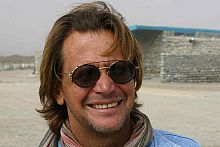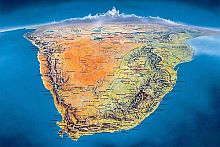A-rated researcher brings wealth of knowledge to SAEON
|
Prof Richard Cowling of the Nelson Mandela Metropolitan University (NMMU) has been appointed as the National Research Foundation’s representative on the SAEON Advisory Board. SAEON eNews caught up with this dynamic A-rated researcher on a brief visit to Pretoria.
Prof Richard Cowling brings a wealth of expertise, experience and knowledge to his role as a member of SAEON’s Advisory Committee.
Rated as one of South Africa’s leading researchers, he has been the recipient of a string of awards for his phenomenally successful research projects - ranging from an A rating from the National Research Foundation (NRF) and the NMMU’s Researcher of the Year to the Society for Conservation Biology Award, membership of the National Academy of Sciences and the Pew Fellows Conservation Program Award, a prestigious international award.
The worldwide recognition he enjoys largely stems from his novel approach to research - he approaches each project broadly and holistically to scrutinise it from various different angles before narrowing it down to fit-for-purpose research.
"I have an incredible curiosity to understand the context of the systems in which I operate, biophysical as well as social, and that opens up novel and unusual research questions," he explains. And when one looks at his research one finds that it is extraordinarily broad - from areas that are likely to be classified as social sciences to hard-core natural science dealing with topics such as the evolution of plants.
"I think it is essential to think broadly and that does not only apply to being an ecologist and exposing myself to social issues, but also to being an evolutionary biologist and learning more about geomorphology and geology," he explains.
Preferring to work in research teams, he normally assembles a range of scientists and postgraduate students to scrutinise an issue from many different angles. "The key to productivity is collaboration," he emphasizes. He says that it is important for researchers to know and understand the limits of their own ability, and to know when to bring other researchers on board. Ultimately this approach yields dividends in the quality, scope and application of the research findings of the projects he manages.
Bridging the science/ policy divide
As a member of committees such as the Strategic Bioregional Planning Committee and Strategy Implementation Committee, Prof Cowling has had extensive experience in the complex issue of bridging the divide between research and implementation, and his experience in this regard will no doubt be of great value to SAEON.
When asked for his recommendations on bridging the science/ policy divide, he is adamant that publishing policy documents on their own doesn’t work. He has found that it is far more effective to work with the policy-makers in drilling down to the root of problems as this enables researchers to respond to the needs of policy-makers with the right kind of research.
As a firm believer that research needs to be user-defined, his advice to young upcoming researchers is to work with the implementing agency from the outset because it is then more likely that the research will be translated into real action on the ground. "You can’t just do research and publish it in a fancy journal and then expect that, miraculously, the information will trickle down to people who are managers, because they probably wouldn’t even read the journal in which you published your research," he cautions.
Asked about how he sees his role as a member of the SAEON Advisory Committee, his determination to get down to the roots of a matter surfaces once more. "I like the idea of SAEON and of being a member of its advisory committee, but I would first like to do my homework to get to a much clearer understanding of the greater SAEON context - its operations, its challenges, its issues," he explained. "I will then be in a much better position to make a constructive contribution to the organisation."
Human impacts are leaving our ecosystems brittle
Biodiversity conservation is a matter that obviously lies close to his heart. Having worked as a botanist in a wide variety of South Africa’s vegetation types - from forests to succulent Karoo, many of them threatened - he admits that he finds it distressing to see the extent to which human impacts are leaving our ecosystems brittle. This has spurred him on to become involved in a number of ‘positive projects’, chief of which is a project aimed at restoring spekboomveld in the Eastern Cape and doing research that could lead to the restoration of hundreds of thousands of hectares.
Like many South African scientists, he was disappointed with the outcome of COP 15, saying that our global institutions are not responding to the current crisis in a way that will lead to real solutions. He is completely opposed to global institutions that "somehow seem to think we can cope with climate change by reducing our carbon emissions and trading them and building this into a business-as-usual scenario. I don’t think we can have a business-as-usual scenario - we’ve got to completely rethink the way we live on this planet".
He argues that climate change should really be regarded as a kind of a proxy for fundamental changes that we as human beings have to make in our behaviour. The bottom line is that it is vital for us to live within our ecological needs. "We have a Pleistocene perspective on life," he argues, "which is all about maximising our immediate gains. It can have disastrous implications for all of humankind if we do not start planning for the long term."
As a proponent of the work of economist Herman Daly who has identified three anathemas, or situations that we find difficult to confront, Prof Cowling says that we have to do those three things simultaneously to be able to live within our ecological means - we need to manage our population growth, redistribute wealth, and consume less. But each of these actions on its own is difficult to put into practice. For an individual household it is almost impossible - whether you move to a forest and start growing your own vegetables, you are still part of the great big wheel of society that is moving at its own pace.
Looking back on his career he says that he has found the teaching side of his work particularly rewarding. He confesses that he feels good about the impact he has had in influencing younger people to take up the natural sciences and in convincing them to build new horizons and think more deeply about the basics, the nature of the environmental crisis that we face.
Deeply rooted in South Africa
Although he appreciates his interactions with the global science community, this internationally renowned scientist describes himself as very deeply rooted in South Africa and local natural systems. His dream for the future is that this remarkable heritage of ecological knowledge and insight that South Africa has, which is still so very much concentrated in the white community in this country, can be passed on - and "that young black people would be willing to accept that baton inasmuch as older white males like me are willing to pass the baton, so that in 20 years’ time there can be recognition that we managed to create a common identity, a common heritage between us".
"Our knowledge of our fauna and flora, and the ecology thereof, can be something that unifies us."












